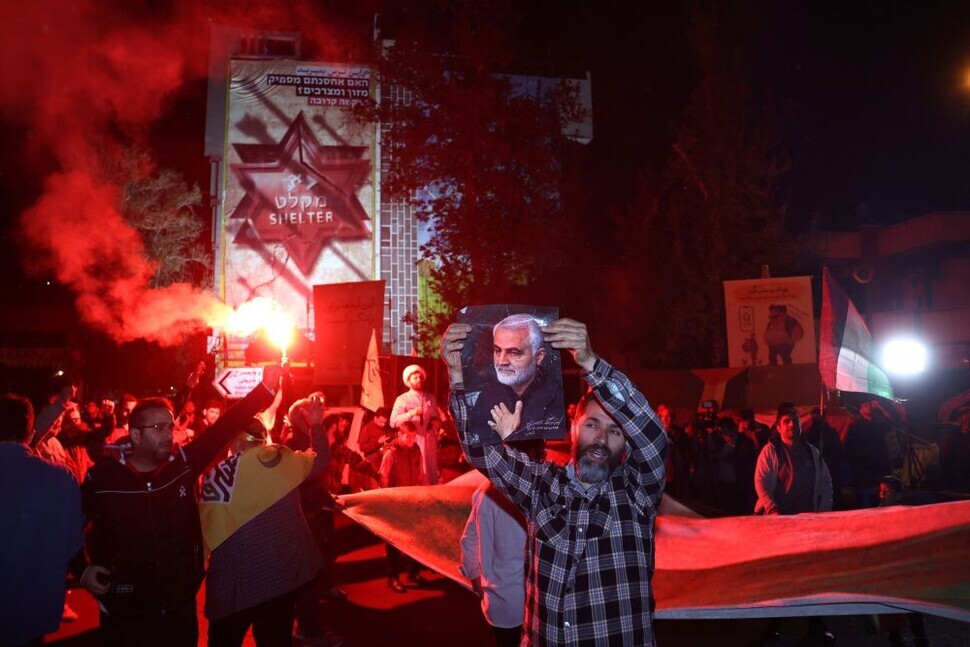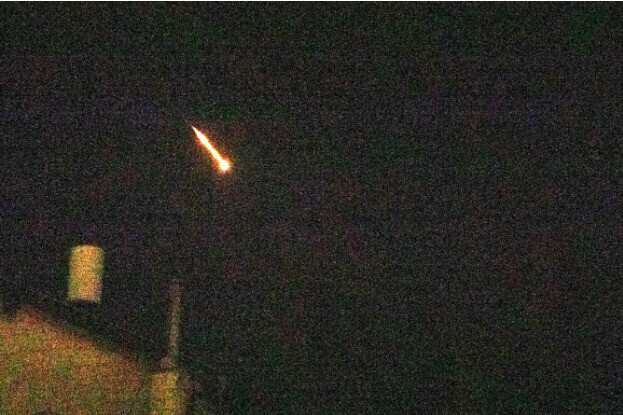hankyoreh
Links to other country sites 다른 나라 사이트 링크
After Iran’s attack, can the US stop Israel from starting a regional war?

For the first time in its history, Iran directly attacked Israeli territory on Saturday, stoking fears of the war in Gaza expanding into a regional war in the Middle East. The question of whether the Israeli-Palestinian conflict expands into a wider regional war now comes down to Israel’s response and the US’ ability to restrain its ally.
Iran’s Ministry of Foreign Affairs released a public statement on Sunday, claiming that “the Islamic Republic of Iran's armed forces have carried out a series of military strikes on Israeli's military bases in response to, and in exercise of its inherent right of self-defense as recognized under Article 51 of the Charter, against Israel's recurring military aggressions, resulting in the martyrdom of the Iranian military advisors present in Syria at the invitation of the Syrian government, in particular the 1 April armed attack against diplomatic premises of the Islamic Republic of Iran in Damascus.”
This is the first time that the Iranian military has initiated a direct strike against the Israeli mainland, a move that could ignite a powder keg that leads to a full-scale war between the two countries.
It is possible that Iran’s attack was merely symbolic and stops at that. On Jan. 3, 2020, a US drone strike killed Qasem Soleimani, a major general in the Islamic Revolutionary Guard Corps, near Baghdad International Airport in Iraq. Iran responded by launching missiles at two US bases based in Iraq on Jan. 8, later claiming that the attack killed over 80 American troops and administrative personnel. Yet in actuality, the US suffered minimal damage, and the US made no real military response to the attack.
According to Israel’s Ynet News, Israeli authorities have announced that the Israeli military intercepted 99% of the drones and missiles launched by Iran.
Yet unlike the US, which had overseas military bases attacked, Israel has been attacked on its mainland, including major cities like Jerusalem and Tel Aviv. Jerusalem is also the base of the Benjamin Netanyahu cabinet, which is often criticized as being Israel’s most far-right administration. The conflict with Iran has the potential to explode into a war, depending on Israel’s response.
After the war broke out after the Palestinian militant group Hamas attacked Israel on Oct. 7 of last year, Israel has engaged in armed clashes with not only Hamas in Gaza and Palestine but with the Lebanon-based Hezbollah and pro-Iran forces based in Syria and Iraq. The international community has voiced concerns about civilian casualties in Gaza, which have exceeded 33,000 at this point. Israel ramped up attacks on overseas forces at the end of last year, when controversy surrounding civilian casualties in Gaza was at its peak.
Israel, however, has not hesitated in attacking forces beyond its borders, effectively paying no heed to outside concerns about an expanding war. This looks to be a strategic move to continue receiving US support and skirt condemnations from Washington and the global community about the conflict in Gaza.

Since the end of last year, the Joe Biden administration in Washington has continually pressured Israel to allow humanitarian aid into Gaza and to consider negotiations for a ceasefire. At the UN Security Council on March 25, the Biden administration abstained from voting on a resolution demanding a ceasefire between Israel and Hamas in the Gaza Strip. The remaining 14 council members voted to approve the resolution. Up until then, the US voted against such resolutions. Abstaining from voting was a tacit way to pressure Israel toward a ceasefire.
Public opinion within the US is also divided on Israel, with many calling for Washington to stop sending weapons to Israel. On April 1, Israel attacked an Iranian consulate without notifying the US beforehand, reportedly infuriating US officials. According to a Washington Post article published on April 11, US Secretary of Defense Lloyd Austin personally expressed his discontent to Israeli Defense Minister Yoav Gallant on April 3, two days after the attack on the consulate.
Yet an Iranian attack that directly targeted the Israeli mainland pressures the Biden administration to ramp up its support for Israel.
The US looks to meditate in the conflict with Iran to avoid a wider war, but the Netanyahu administration will likely exploit the Iranian attack as leverage to resist US attempts to restrain it.
By Jung E-gil, senior staff writer
Please direct questions or comments to [english@hani.co.kr]
Editorial・opinion
![[Column] Season 2 of special prosecutor probe may be coming to Korea soon [Column] Season 2 of special prosecutor probe may be coming to Korea soon](https://flexible.img.hani.co.kr/flexible/normal/500/300/imgdb/original/2024/0426/3317141030699447.jpg) [Column] Season 2 of special prosecutor probe may be coming to Korea soon
[Column] Season 2 of special prosecutor probe may be coming to Korea soon![[Column] Park Geun-hye déjà vu in Yoon Suk-yeol [Column] Park Geun-hye déjà vu in Yoon Suk-yeol](https://flexible.img.hani.co.kr/flexible/normal/500/300/imgdb/original/2024/0424/651713945113788.jpg) [Column] Park Geun-hye déjà vu in Yoon Suk-yeol
[Column] Park Geun-hye déjà vu in Yoon Suk-yeol- [Editorial] New weight of N. Korea’s nuclear threats makes dialogue all the more urgent
- [Guest essay] The real reason Korea’s new right wants to dub Rhee a founding father
- [Column] ‘Choson’: Is it time we start referring to N. Korea in its own terms?
- [Editorial] Japan’s rewriting of history with Korea has gone too far
- [Column] The president’s questionable capacity for dialogue
- [Column] Are chaebol firms just pizza pies for families to divvy up as they please?
- [Column] Has Korea, too, crossed the Rubicon on China?
- [Correspondent’s column] In Japan’s alliance with US, echoes of its past alliances with UK
Most viewed articles
- 1‘We must say no’: Seoul defense chief on Korean, USFK involvement in hypothetical Taiwan crisis
- 2Why Kim Jong-un is scrapping the term ‘Day of the Sun’ and toning down fanfare for predecessors
- 3Two factors that’ll decide if Korea’s economy keeps on its upward trend
- 4Gangnam murderer says he killed “because women have always ignored me”
- 5South Korea officially an aged society just 17 years after becoming aging society
- 6BTS says it wants to continue to “speak out against anti-Asian hate”
- 7After election rout, Yoon’s left with 3 choices for dealing with the opposition
- 8No good, very bad game for Korea puts it out of Olympics for first time since 1988
- 9Ethnic Koreans in Japan's Utoro village wait for Seoul's help
- 10US citizens send letter demanding punishment of LKP members who deny Gwangju Massacre